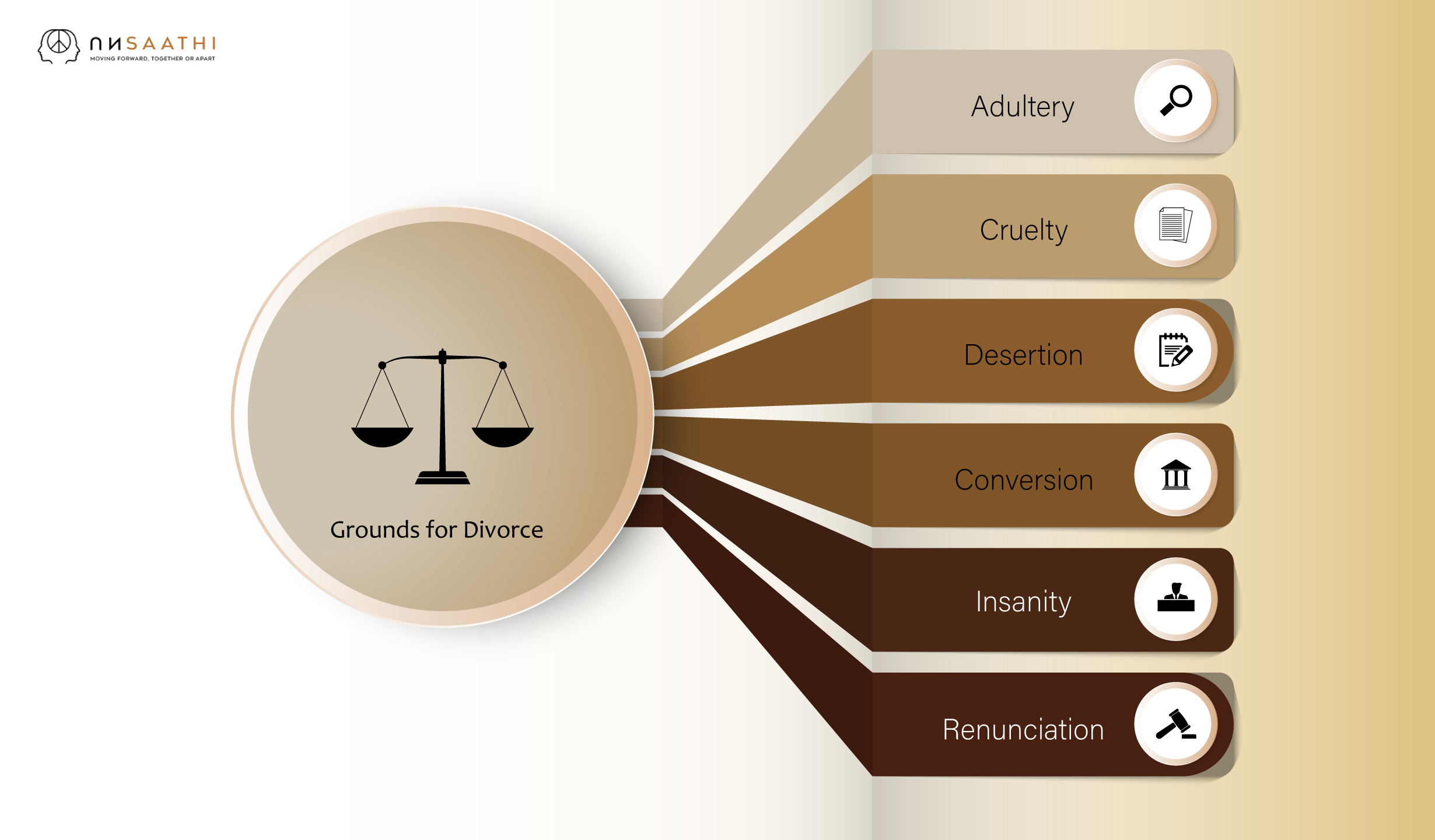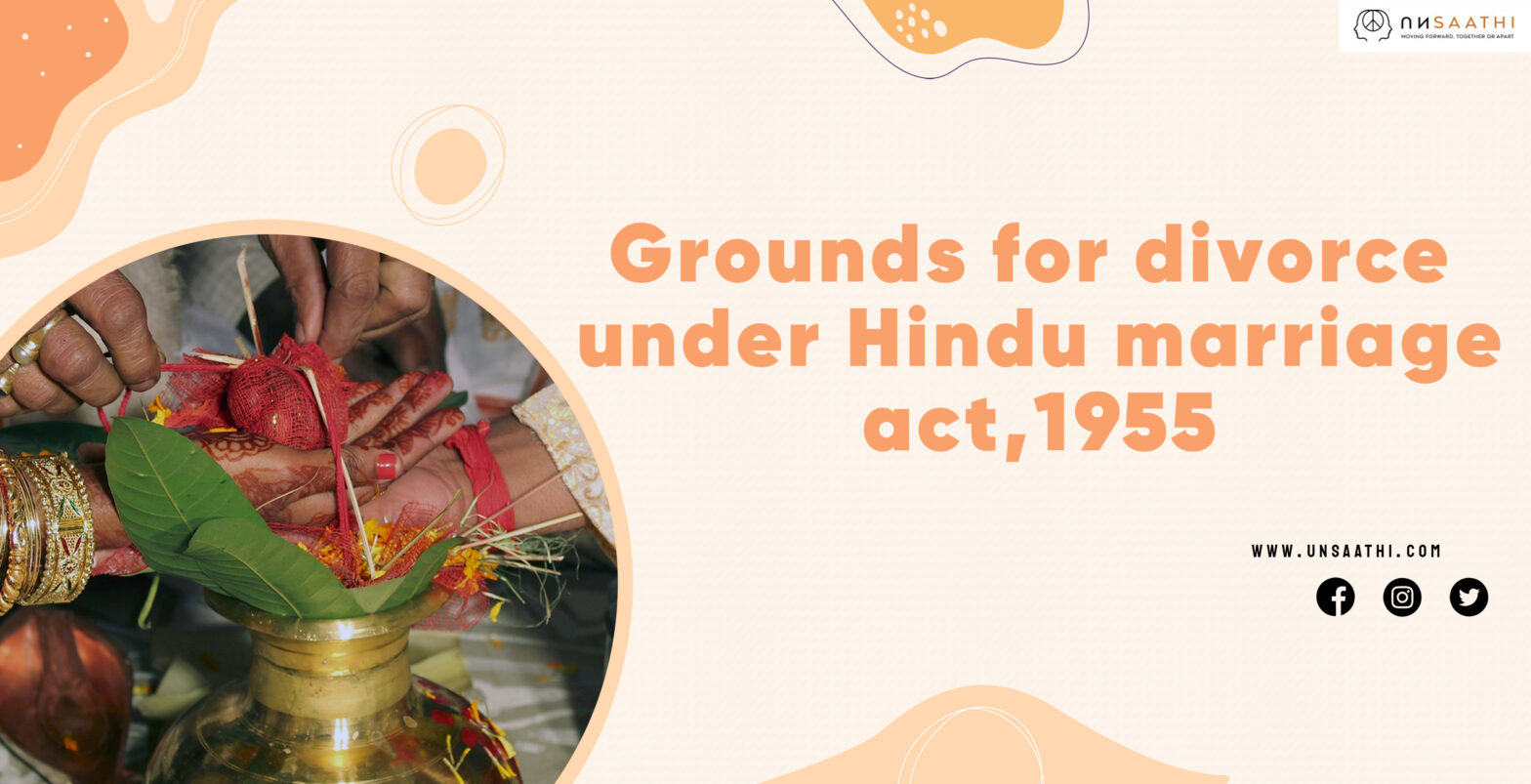
Marriages are a union of two individuals keen on spending their life together. But when life throws curveballs, all the promises lose their significance, and cracks appear in the relationship. A lover’s spat, infidelity, desertion, constant bickering, and other incidents – cause trouble in paradise where couples end up seeking divorce to end the relationship once and for all. Not only that but sometimes either spouse chooses to file for divorce to get rid of marital obligations and responsibilities as well.
In India, people follow personal laws in matters of marriage and divorce. Hindus rely upon Hindu Marriage Act, 1955 to seek dissolution of marriage. In this day and age, when more and more people are choosing to leave their spouse due to internal differences, it is crucial to understand grounds for divorce under Hindu law, special grounds that can be sought by the wife alone, and circumstances in which a couple can mutually apply for divorce.
Divorce under Hindu Law
A large section of Hindus viewed divorce as a threat to the institution of marriage. This thought developed from the teachings of Manu since according to him, a husband and wife could not break their marital tie. It could be broken only upon the death of either spouse.
While marriage is considered an unbreakable bond in Hinduism, legislators understood the need to be at parity with changing times by keeping the law dynamic, and introducing the concept of divorce to Hindus via the enactment of the Hindu Marriage Act, 1955.
The Hindu Marriage Act does not define the term ‘divorce’ explicitly but mentions that it means ‘dissolution of marriage’.
Grounds for Divorce
Section 13 of the Hindu Marriage Act, 1955 sheds light on the grounds of divorce. It contains 9 grounds upon which either spouse can file for divorce.
Adultery
Section 13(1)(i) of the Hindu Marriage Act discusses adultery as a ground for divorce. The provision states that if a married person cohabits with an individual other than his/her spouse in the course of the marriage, he/she will be said to have engaged in adulterous acts. The burden of proof lies on the petitioner.
Initially, adultery was known as a crime as per section 497 of the Indian Penal Code. However, in the case of Joseph Shine v Union of India (2018), the Apex Court struck down the aforementioned section and stated that it is one thing to allow divorce on the grounds of infidelity but quite another to add the touch of criminality to the act of infidelity since it worsens the situation and complicates it further by interfering in a couple’s personal matter.
A marriage is a personal matter between two individuals, and a law cannot punish a man for cheating on his/her spouse when the alternative of divorce is already available as a recourse.
Cruelty
Section 13(1)(i) of the Hindu Marriage Act discusses cruelty as a ground for divorce. The term ‘cruelty’ has not been defined explicitly in this section. Primarily, the courts have relied upon English cases to deduce the meaning of cruelty, and its meaning continues to evolve. However, cruelty to women has been discussed in Section 498A of the Indian Penal Code and treated as a criminal offence.
In case, A. Jayachandra v Aneel Kaur (2005), the Supreme Court observed that cruelty can be both mental and physical.
When assessing whether the conduct of one spouse is cruel or not, it is pertinent to determine whether such conduct would make the life of another spouse miserable to the extent that living together is next to impossible.
Desertion
Section 13(1)(ib) of the Hindu Marriage Act mentions desertion as a ground for divorce. Desertion means abandoning a spouse or petitioner without a just cause.
If the petitioner has been abandoned by his/her spouse for two years preceding the presentation of the petition, then it can be one of the grounds for divorce. Not only that but if the petitioner’s spouse has refused to live with the partner out of the blue, and does not discharge his obligations towards the petitioner anymore, that shall also count as desertion. However, if the petitioner remains in touch with the spouse through electronic or physical means in the period of two years preceding the filing of the petition, he/she cannot claim divorce on this ground.
Insanity
Section 13(1)(ii) of the Hindu Marriage Act discusses conversion as a ground for divorce. Conversion denotes when a married Hindu man or woman adopts another religion such as Islam, Christianity, etc, and ceases to be a Hindu. If one spouse ceases to be a Hindu, the marriage falls apart since it ceases to meet the criterion of marriage by virtue of Section 5 of the aforementioned Act.
Conversion
Section 13(1)(iii) of the Hindu Marriage Act discusses insanity as a ground for divorce. Insanity means when the person is not in a mental state to make sound decisions for himself or to differentiate between right and wrong. A married man or woman who has a spouse suffering from incurable unsoundness of mind or who suffers continuously or periodically from any mental disorder can seek divorce under this ground.
marriage falls apart since it ceases to meet the criterion of marriage by virtue of Section 5 of the aforementioned Act.
Leprosy
Section 13(1)(iv) of the Hindu Marriage Act discussed leprosy as a ground for divorce. It was stated that if the petitioner’s spouse was suffering from the deadly and incurable nature of leprosy, she/he has the burden of proof for seeking divorce on this ground. However, leprosy has been deleted from the definition as per Personal Laws Amendment, Act (2019) since it promotes unfairness towards individuals suffering from this disease.
Venereal Disease
Section 13(1)(v) of the Hindu Marriage Act discusses venereal disease as a ground for divorce. If a married man or woman suffers from a sexually transmitted disease that is both transferable and incurable, the spouse can seek divorce on this ground.
Renunciation
Section 13(1)(vi) of the Hindu Marriage Act discusses renunciation as a ground for divorce. When a married man or woman embraces holy order by renouncing the world, his/her spouse can seek divorce on this ground. However, the act of renouncing the world must be absolute.
Presumption of Death
Section 13(1)(vii) of the Hindu Marriage Act discusses the presumption of death as a ground for divorce. If a married man or woman has not been seen alive or heard from for 7 years by any such person who would have heard from him/her has she/he been alive, he/she shall be presumed to be dead. In such a situation, the spouse can seek divorce on this ground.
Special Grounds for Divorce for Wife
Section 13(1)(vii) of the Hindu Marriage Act discusses the presumption of death as a ground for divorce. If a married man or woman has not been seen alive or heard from for 7 years by any such person who would have heard from him/her has she/he been alive, he/she shall be presumed to be dead. In such a situation, the spouse can seek divorce on this ground.
The Hindu Marriage Act provides for two special grounds under which a wife can file for divorce. These grounds are discussed as follows:
Presence of more than one wife
Section 13(2)(i) of the Hindu Marriage Act states that if a man had more than one wife living at the time after the commencement of this Act, a wife can file for divorce on this ground. However, the other wife should be alive at the time when the petitioner is presenting the petition in court. No divorce can be filed under this ground if the other wife had died before presenting the petition in court. The petitioner does not need to prove the existence of the first wife at the time of the second marriage using direct proof.
Rape, Sodomy, or Bestiality
If the husband engages in acts of rape, sodomy, or bestiality after the solemnization of marriage, the wife can seek divorce on this ground under section 13(2)(ii) of the Hindu Marriage Act. None of these acts can be condoned under any circumstances. More so, rape is a heinous crime, and a criminal offense under section 375 of the Indian Penal Code.
No Cohabitation for 1 year after passing of maintenance award against husband
If the maintenance award has been passed against the husband and no sexual intercourse takes place between them following the maintenance award for one year or more, the wife can seek divorce on this ground under section 13(2)(iii) of the Hindu Marriage Act.
Divorce by Mutual Consent
Section 13(B) states that if a husband and wife are living separately for one year or more and believe they have no chance of reconciliation under any circumstances, they can mutually file a petition for divorce before the Family Court. In the case of Sureshta Devi v Om Prakash (1992), the Hon’ble ruled that the parties could live under the same roof but should not have any relationship between husband and wife between them. Moreover, in the case Jayashree Ramesh Londhe v Ramesh Bhikaji (1992), the Supreme Court observed that either party could not choose to withdraw the petition once filed without the permission of the other since it was a joint petition filed mutually by the parties.
Conclusion
The legislative intent behind introducing ‘divorce’ under Hindu Marriage Act has stood the test of time since no provision allows for the filing of frivolous petitions. A husband or wife seeking divorce has to think it through before taking such a huge step since Courts demand proof, and the burden of proof lies on the petitioner only. The progressive approach of the legislators reflects in Section 13. Wives have the right to file petitions for divorce in some cases. Not only that, but the introduction of divorce by mutual consent has made it easier for cooperative and mature spouses to seek divorce without making it a mess for themselves and their families.
While some partners may choose to file for divorce in a moment of impulse, the court has granted them a sufficient cooling period to reconcile with their partner in case they have a change of heart. It shows that Courts strive towards preservation of marriage and grant divorces in the matter only where subsistence of marriage between two parties would wreak havoc not only on the concerned individuals but affect their peace and deteriorate their quality of life.



